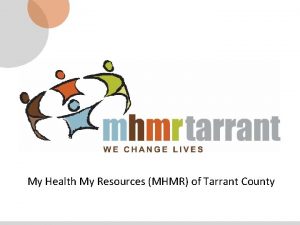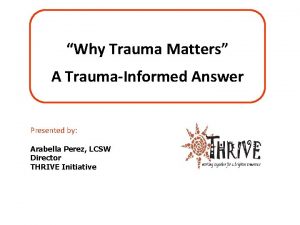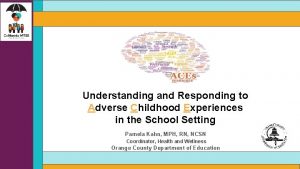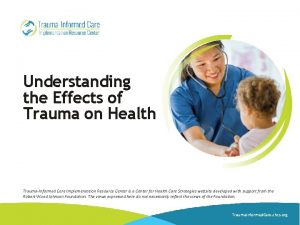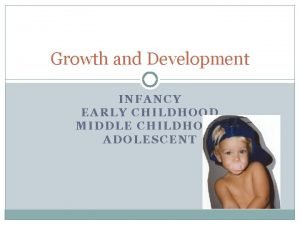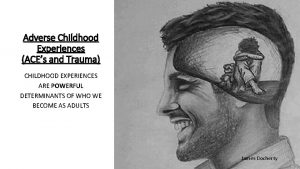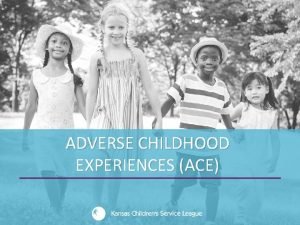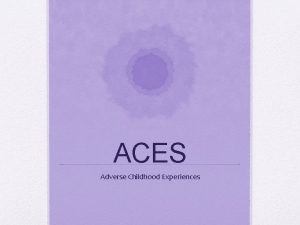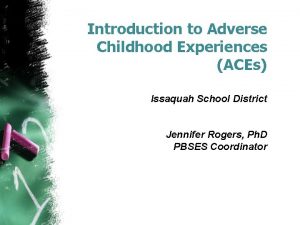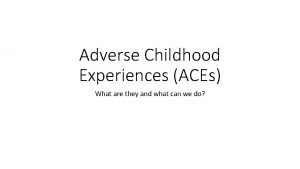Translating evidence on adverse childhood experiences ACEs into











- Slides: 11

Translating evidence on adverse childhood experiences (ACEs) into practice: an example of using an ACE lens for policy development in South Wales Kat Ford 1, 2, Kath Ashton 1, Karen Hughes 1, 2, Alisha Davies 1, Janine Roderick 1. 1 Public Health Wales, 2 Bangor University

Adverse Childhood Experiences (ACEs) ‘ACEs are stressful experiences occurring during childhood that directly harm a child (e. g. sexual or physical abuse) or affect the environment in which they live (e. g. growing up in a house with domestic violence) Bellis et al 2016

Prevalence of ACEs in Wales

ACEs and poor outcomes Compared with people with no ACEs, those with 4+ were: 2 x 3 x 3 x 4 x 6 x 11 x 14 x 15 x 20 x more likely to be diagnosed with a chronic disease more likely to develop Heart disease more likely to have attended A&E more likely to be a high-risk drinker more likely to have low mental wellbeing more likely to have smoked cannabis more likely to have been a victim of violence more likely to have perpetrated violence more likely to have been incarcerated

Impact from preventing ACEs in future generations


Use of evidence in Wales to promote partnership working to prevent at a local level Well-being of future generations (Wales) Act 2015 Taking Wales Forward 2016 -2021 Welsh Government PHW strategic plan ‘Support families and parents to reduce adverse childhood experiences which can have lifelong effects’ South Wales Police & Crime reduction plan

Using an ACE lens for policy development in South Wales: The Early Intervention and Prevention project In 2015, 89% of South Wales Police contact related to complex welfare, public safety and vulnerability issues Police are well-placed to identify individuals at risk of ACEs Excess demand: in 2016 >60, 000 safeguarding referrals Vision: The police and partners will have the right knowledge, skills and support to identify and respond appropriately and effectively to early indicators of harm and vulnerability, breaking the generational cycle of crime.

Response to vulnerability by South Wales Police Research: ~400 hrs observations Focus groups and interviews with police staff Interviews with statutory partners Focus groups with public Recommendations for change: • Pilot a multi agency, early intervention approach to vulnerability with NPTs • Deliver training on ACEs to frontline police • Develop an ACE informed approach to the existing processes for safeguarding referrals • Develop a 24/7 ACE informed approach to responding to vulnerability • Assist SWP with the development of their well-being agenda

Responding to ACEs across other sectors

Thank you Dr Kat Ford Katharine. ford@Bangor. ac. uk
 Adverse childhood experiences study
Adverse childhood experiences study Schoolsworkpro
Schoolsworkpro Adverse childhood experiences study
Adverse childhood experiences study Slidetodoc.com
Slidetodoc.com Adverse childhood experiences study
Adverse childhood experiences study Translating english into logical expressions
Translating english into logical expressions Translating a sentence into a one-step equation
Translating a sentence into a one-step equation Math problem
Math problem Translate
Translate Translating strategy into action
Translating strategy into action Principles of growth and development
Principles of growth and development How to write an aces paragraph
How to write an aces paragraph
